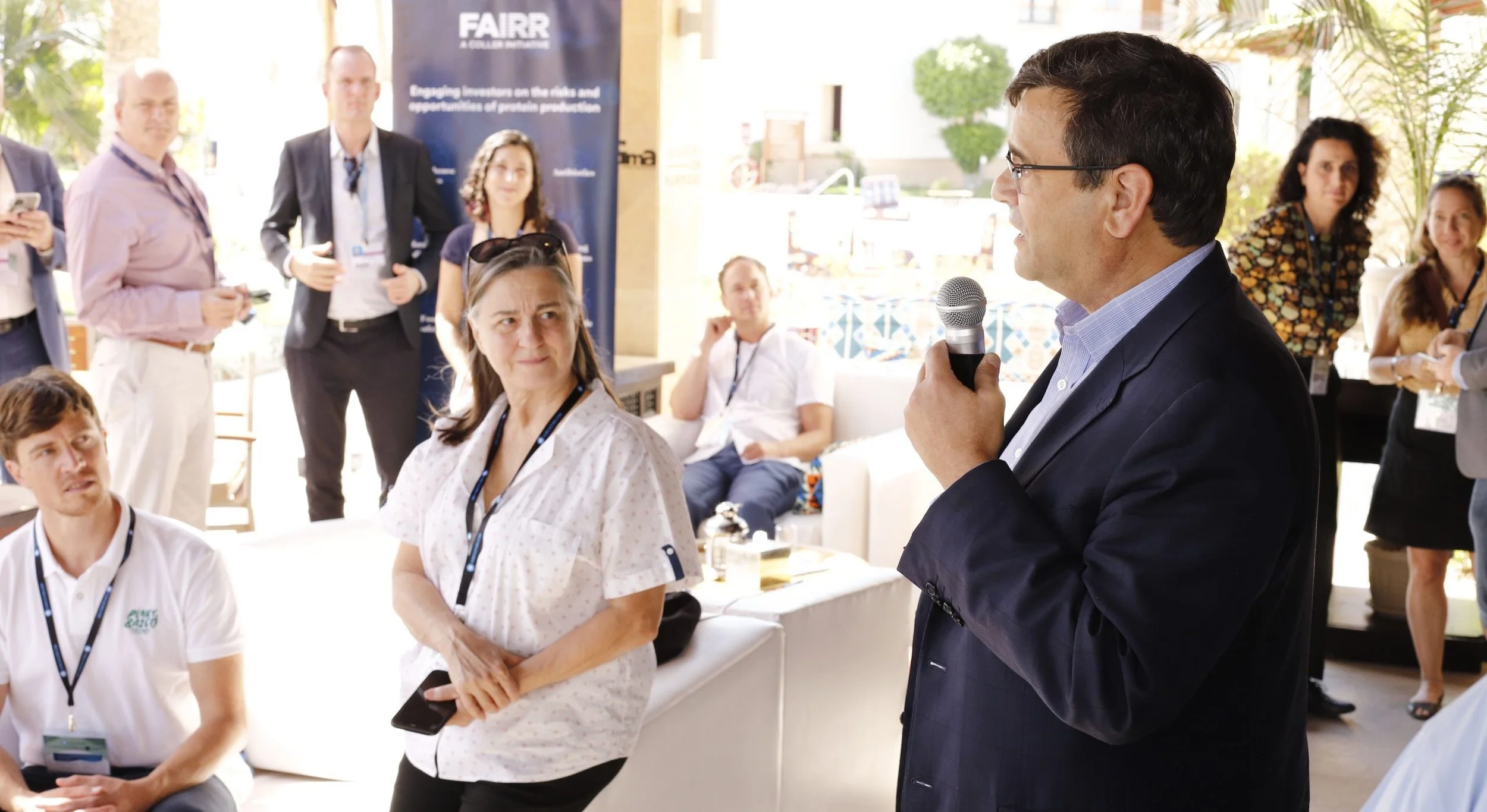Case Study SEVENTEEN
Jeremy Coller’s Dolittle Capstone
A masterplan to end factory farming
“A meaningful life is an authentic life.”
— Jeremy Coller
INTRODUCTION
What happens when the ‘Godfather of Private Equity Secondaries’ decides his billion-dollar biography is… boring?
At 55, Jeremy Coller was managing $17 billion in assets and had pioneered an entire market. Industry titans revered him. But personally? Something was missing.
“Other people reaching the half-century mark and totting up the ledger of their accomplishments might buy a Ferrari or take a trip around the world. But I sat down and thought about the future. The shock treatment of looking ahead reframed my thinking.”
Instead of resting on his financial laurels, he did something radical. He mapped out the next 40 years of his life, and set a goal few financiers would dare say aloud:
End animal factory farming. Within a generation.
CORNERSTONE
Jeremy describes himself as a scared child. His father died when he was young, and he struggled with a learning disability. At just 11, he became a vegetarian, not out of trend, but out of principle.
“I didn’t feel I had the right to choose which animals deserved to die. It all felt inhumane.”
That early moral clarity stayed dormant for decades, but it never disappeared.
KEYSTONE
Jeremy built his career quietly rewriting the rules of investment. After studying at Manchester School of Management and the Sorbonne, he joined Fidelity and later the ICI Pension Plan, where he spotted something others had missed: the untapped value of secondary positions in private equity.
In 1990, he founded Coller Capital to specialise in this niche. Over time, that niche reshaped an entire market. Today, the firm has a global team of over 160, with stakes in more than 300 private equity funds and exposure to 2,500 companies worldwide. Its most recent fund, Coller International Partners VII, raised over $7 billion from 170 institutional investors.
Jeremy was recognised as one of the 20 most influential figures in private equity. He had reached the summit in finance and investments. But for Jeremy, the view wasn’t what he had hoped.
He had, however, already demonstrated Capstone instincts during this phase of life. In 2002, he launched the Jeremy Coller Foundation, focused on strategic grant allocation with long-term systems change in mind.
CAPSTONE
Jeremy’s pivot began with a sobering thought experiment. A friend wrote an obituary for him, imagining his life at age 98. Reading it back, Jeremy was horrified.
“It was a snooze,” he admitted. “That jolted me.”
He started to think about what a second obituary would look like. He would:
“Use the additional 44 years for crazy, shoot for the moon projections of what I might achieve by 98. Alongside my continuing ambitions for Coller Capital, the obituary included a shopping list of achievements, from having a business school named after me to using state-owned assets to kick start pension systems.”
In 2015, with support from his foundation, he launched FAIRR (Farm Animal Investment Risk and Return). This wasn’t about feel-good charity activities. It was a systemic intervention. Jeremy would apply the same rigour that transformed private equity, this time to food systems and animal welfare. He believes that “factory farming is the mother of all sustainability issues,” and through the Foundation he aims to accelerate progress in this underfunded but crucial area.
His Capstone helped inform the storytelling section of the book. Jeremy has been a proponent of the three stages of truth. He comes from a different angle, focusing on fact-based insights that investors could not ignore.

~ Truths Investors Can’t Ignore ~
FAIRR began by spotlighting some uncomfortable but undeniable realities:
Human Health
80% of antibiotics in the US, and 50% in Europe, are used in factory farms. This overuse accelerates antibiotic resistance.Climate Change
Livestock farming generates more greenhouse gases than the transport sector.Food Security
It takes 6kg of plant protein to produce just 1kg of animal protein.Deforestation
Over 90% of Amazon deforestation is linked to livestock farming.
Jeremy contextualised factory farming as one of the defining global challenges of our time.
FAIRR is underpinned by his foundation’s belief that “a growing human population with finite resources requires an alternative agricultural model.” FAIRR’s mission is to help investors manage risk, identify market opportunities, and accelerate the shift to sustainable food systems. It is backed by over $23 trillion in assets under management, making it one of the fastest-growing ESG coalitions in the world.
Jeremy understood that most investors wouldn’t act on animal welfare alone. So he reframed it. This wasn’t just about ethics, it was about economics.
“People are human animals. Pigs, cows, sheep and chickens can’t stand up for themselves—all the more reason to fight for their, and their investors’, best interests.”
THE COLLER DOLITTLE CHALLENGE
In 2020, Jeremy went even further. He launched the Coller Prize for Interspecies Conversation, a $1 million award for breakthroughs in AI-powered human–animal communication. His foundation partnered with Interspecies I/O, a consortium including Peter Gabriel, Vint Cerf, Diana Reiss and MIT’s Neil Gershenfeld. Their shared belief? That advances in AI, cloud computing and big data could help decipher non-human languages, and forever change how we relate to other species.
In 2021 Jeremy announced the Coller Dolittle Prize, named after the fictional animal-speaking Doctor Dolittle, awarded to academics advancing research on farmed animal welfare and the impact of factory farming.
The Coller Dolittle Challenge is a global scientific competition launched by the Jeremy Coller Foundation in partnership with Tel Aviv University. Its goal is to advance two-way interspecies communication, not just understanding animals’ signals, but enabling communication in which animals respond in measurable ways. Essentially, an “animal version” of a Turing test. An annual prize of $100k is awarded each year to research teams whose recent work meets the contest’s criteria.
If a team eventually “cracks the code” of interspecies two-way communication (meaning an animal communicates independently, without realising it’s communicating with a human) then there is a Major Prize for a breakthrough in the field: either $10 million in equity investment or $500k in cash.
The methods must be non-invasive, demonstrate communication in more than one context, and show a measurable response by the animal to the signals that are broadcast. Its first award recognised a dolphin vocalisation project.
“We’re seeking the conversation algorithm that will unlock in ourselves a greater sense of respect for those other animals with whom we share our planet.”
Jeremy isn’t just reframing farming. He’s reframing the moral hierarchy we have built between humans and other animals.
In 2025, his Foundation donated £4 million to create the Jeremy Coller Centre for Animal Sentience at the London School of Economics. It funds research designed to be interdisciplinary into animal minds and emotions using approaches drawn from philosophy, neuroscience, law, and behavioural science.
Jeremy is showing that purpose-driven capital can challenge moral blind spots and expand our collective imagination.

CAPSTONES AS INCONVENIENT TRUTHS
One could argue Jeremy’s mission is still in the ridicule stage of truth. But that’s the point.
Jeremy is essentially funding ideas that may be resisted today but could become tomorrow’s accepted truths. He’s forcing us to confront a fifth inconvenient truth alongside the previous four outlined: that we’re not as different from animals as we think. This all ties in with his ultimate Capstone goal: fuelling the journey to acceptance that puts to an end factory farming.
LEARNINGS FROM JEREMY COLLER’S CAPSTONE
Don’t wait until you’re bored of the view from the summit
Translate inconvenient truths into investable theses / language your audience would understand
Combine empathy and economics to shift systems
Don’t be afraid to start the conversations others aren’t ready for yet
Expect ridicule in some quarters
It will face strong opposition from entrenched food industry lobbies in the future
In the future, it may become self-evident, the norm, that addressing animal welfare is central to solving climate, health, and food security challenges.
“Luck is looking for people, looking for luck. Once you have a destiny, your antennae go up and serendipity happens. It is amazing how the world soon parts for you.”
— Jeremy Coller


